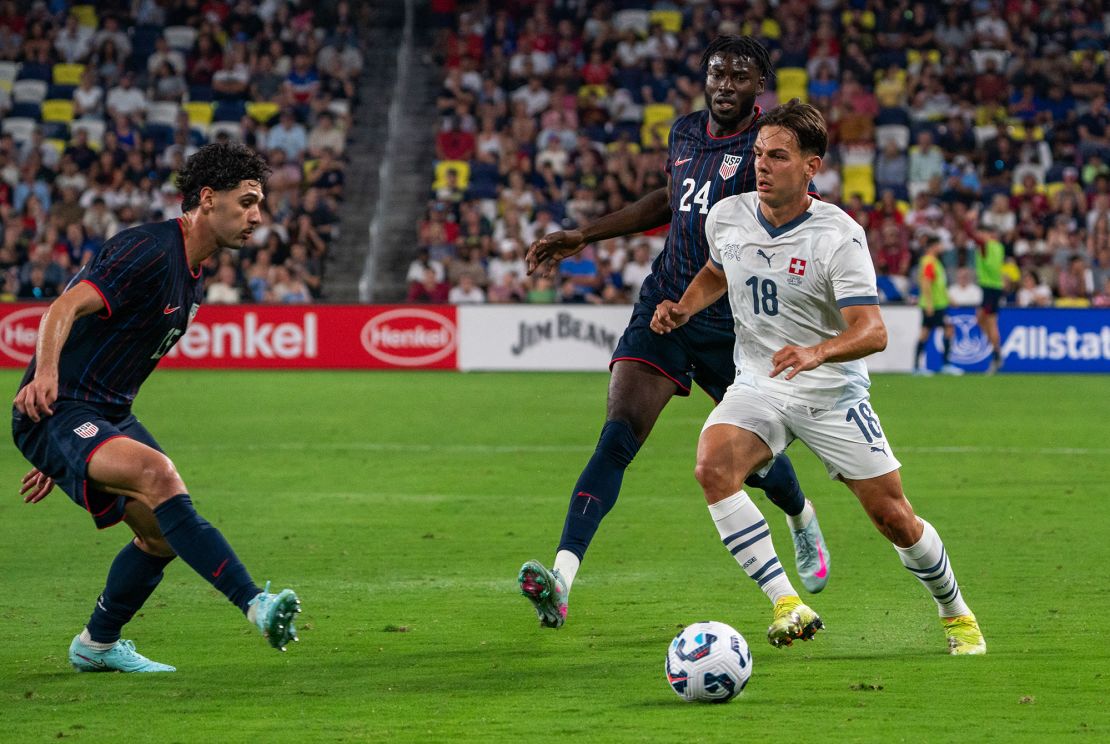With just 12 months left until the United States co-hosts the 2026 FIFA World Cup, the U.S. Men’s National Team (USMNT) finds itself in a worrying slump. A humiliating 4-0 loss to Switzerland has highlighted deep concerns about the team’s readiness, casting a shadow over what was meant to be a defining moment for American soccer.
A nightmare in Nashville
Tuesday night in Nashville should have been a routine friendly. Instead, it became an embarrassment. The USMNT was dismantled 4-0 by Switzerland, a capable but hardly dominant side. All four goals came in the first 36 minutes, with fans in Geodis Park responding with loud boos that echoed the frustration of a nation.
Switzerland is no pushover—it features experienced European talent—but the United States is hosting the World Cup in a year. This is the level of opposition they will face, and on current form, they look far from prepared to compete, let alone advance past the group stage.
This latest defeat extends the USMNT’s winless run against European teams to eight games and marks its fourth consecutive loss in all competitions. A year from kickoff, the team appears to be spiraling, not ascending.
Pochettino under pressure

Much of the criticism following the loss centered on head coach Mauricio Pochettino, who admitted fault for selecting an inexperienced lineup. Three players, including Sebastian Berhalter—the son of former coach Gregg Berhalter—made their debut or first start. By halftime, with the game already lost, Pochettino made five changes to stem the bleeding. “It was my decision and that decision didn’t work,” he told reporters. “And when that doesn’t work, you need to criticize yourself.”
Pochettino’s arrival in September 2024 was meant to usher in a new era. Known for developing talent and guiding Tottenham Hotspur to the 2019 Champions League final, his appointment was hailed as a bold move by U.S. Soccer. But almost a year in, his record is a middling 5-5, marred by underwhelming performances and tactical inconsistencies. His previous club stints with PSG and Chelsea ended with mixed reviews, and the transition to international management appears rockier than anticipated. The World Cup on home soil was supposed to be a platform for progress—so far, it looks more like a crisis unfolding in slow motion.
Critics and cracks in the foundation
The reaction to the team’s form has been predictably harsh. Former USMNT star Clint Dempsey rated his level of concern a “six or seven out of ten” back in April. Since then, the situation has only worsened.
Even Bruce Arena, the USMNT’s most successful coach, questioned Pochettino’s fit for the job. “I’m sure our coach is a very good coach, but coaching international football is different than club football,” Arena said earlier this year. “It’s a completely different job.” The underlying issue may be cultural as much as tactical. Arena warned that a lack of familiarity with the U.S. player pool and development environment could hinder any foreign coach’s success. Despite his pedigree, Pochettino has yet to demonstrate a clear understanding of the American soccer landscape.
The players, for their part, are toeing the line publicly. Veteran defender Walker Zimmerman urged calm, pointing to how much can change in a short time. “It’s not the end of the world,” he told TNT Sports. “We accept that it’s not good enough, and we have to flip the script.”
A crucial Gold Cup, with a weakened squad
The next opportunity to “flip the script” comes quickly. The USMNT begins its CONCACAF Gold Cup campaign this weekend against Trinidad and Tobago, followed by matches against Saudi Arabia and Haiti. The tournament, which the U.S. has won seven times, is now critical—not only as a chance to win silverware but to restore some measure of faith. But even this opportunity feels compromised. Key players will be absent: Christian Pulisic, the team’s most high-profile star, is resting due to fatigue. Weston McKennie and Tim Weah are tied up with Juventus at the Club World Cup. Defenders like Sergiño Dest are out due to injury recovery.
The result? A team that bears little resemblance to the one that will take the field at the World Cup next summer. Pochettino, once again, will be left trying to build cohesion without his core group. “It’s difficult to have continuity and balance,” he said, echoing a familiar theme of frustration.
But with time running out, those explanations increasingly sound like excuses.
A year to find an identity
For all the negativity, there is one consolation: time. The 2026 World Cup doesn’t kick off for another 12 months. There’s still a window to correct course—to build chemistry, recover players, and craft a tactical identity that inspires confidence rather than dread.
Whether Pochettino is the man to lead that transformation remains an open question. The faith that U.S. Soccer placed in him was based on vision and potential. As the countdown to the tournament accelerates, results—and results alone—will be the true measure of his tenure. The dream was that hosting the World Cup would mark a turning point for American soccer, showcasing a new generation of talent on a world stage. If current form holds, that dream could quickly become a public reckoning. The next few months won’t just define the team—they may define the future of U.S. men’s soccer for years to come.




